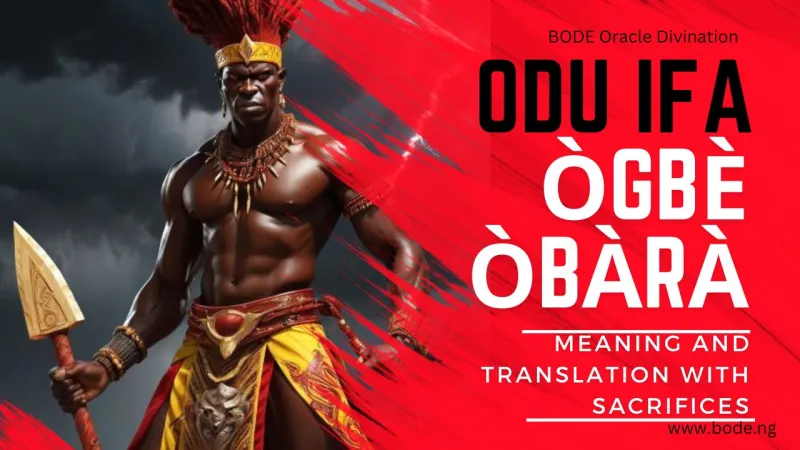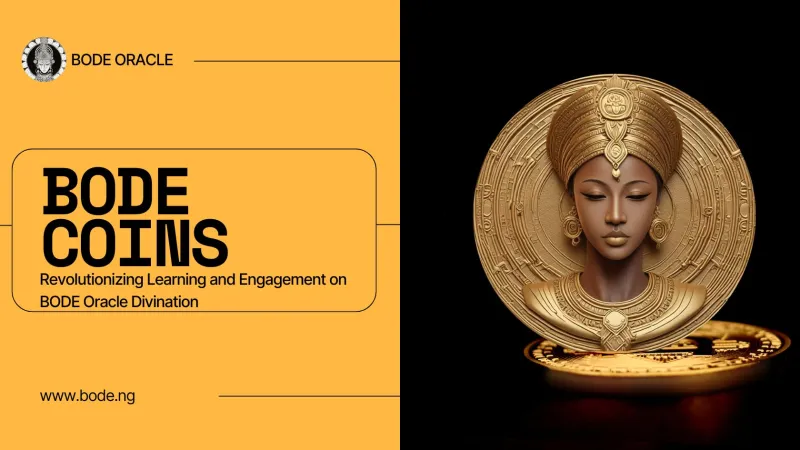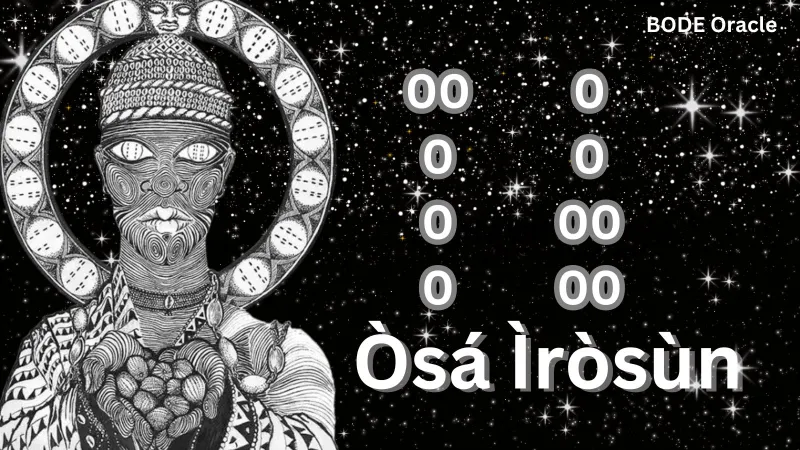Ogbe Obara, also known as Ogbe Bara, is an Ifá verse that speaks of triumph, divine favor, and resilience. It tells the story of Olúkóso (Ṣàngó) and his fiery justice, the perseverance of Àágbérí the Chameleon, and the cautionary tale of the snail, rat, and snake. Through these sacred teachings, Ifá provides guidance on overcoming enemies, ensuring longevity, and heeding divine warnings.
Ogbe Obara, Ogbe Bara: Ifa Olukoso Arabambi
Ifá pé óun pé ire iṣégun áti ire éyónú fún ẹni tó dá Ogbè Òbàrà. Ifá pé ẹbọ ni ki ó ru.
Írúlá kò ṣe ọmọ inú ré ṣe pèlé
A d’Ífá fún Olúkóso lá’lú
Arábámbí a fi igba ọta ṣé’gun
Èyí tí yí óó fi àlàpà ṣé’gun ótá ré
L’ójó tí Olúkóso lá’lú ńbínú.
Írúlá kó ṣe ọmọ inu rè ṣe pèlé
A d’Ífá fún Ogbè
L’ọjọ tí ó ńlọ rèé bẹ àrírá
Ní àkókò tí Ifá sọ yíí, àwọn òtá yájú si Ṣàngó, ni Ṣàngó bá binu sí àwọn òtá ré nipa rirọ òjò iná lé wón l’óri. Àwọn òtà kò gbádùn mó, ni wón bá ro’nú titi wipe tani yí óò bá áwọn bẹ Ṣàngó. Ni wón bá lo ké sí Òrúnmìlà wipe kó wá lọ bá àwọn bẹ Ṣángó.
Wón bọ orisi-risi nkan tí ẹnu ńjẹ pelu igba (200) orógbó, óbúkọ kan. Ni Òrúnmìlà bá kó gbogbo nkan wonyi lọ sí òdọ Ṣàngó. Bi Ṣàngó ṣe fi ojú ri orógbó, ní ó bá yonu si àwón òtà ré, ó l’òun kò ni binu sí wọn mọ. Bí Òrúnmìlà ṣe kúrò l’ódò Ṣàngó ni òjò ṣú.
Òrúnmìlà pelu òjò ló padá wọ’lé. Òjò tó ti ńrọ gbígbònà, tutu ni ó rò. Láti ọjó yií ni Ṣàngó tí yónú sí áwọn òtà ré. Òrúnmìlà ni:
Írúlá kò ṣe ọmọ inú ré ṣe pèlé
A d’Ífá fún Olúkóso lá’lú
Arábámbí a fi igba ọta ṣé’gun
Èyí tí yí óó fi àlàpà ṣé’gun ótá ré
L’ójó tí Olúkóso lá’lú ńbínú.
Írúlá kó ṣe ọmọ inu rè ṣe pèlé
A d’Ífá fún Ogbè
L’ọjọ tí ó ńlọ rèé bẹ àrírá
Ogbè ni ó bẹ àrìrà, òjò ni ó bose awo.
English Translation
Ifá declares that it calls forth the blessings of victory and favor for the one for whom Ogbe Obara appears. Ifá says they should offer sacrifices.
Irula was not gentle with her child
This was the Ifá cast for Sango,
The god of thunder, who uses 200 enemies to gain victory,
Who will overcome his enemies with great strength,
On the day Olúkóso was in anger.
Irula was not gentle with her child
This was the Ifá cast for Ogbe, On the day they were going to beg for mercy.
At this time in the Ifá narrative, enemies had risen against Ṣàngó (Olúkóso), and in his anger, he struck them down by unleashing fiery rainstorms upon them. The enemies became desperate and decided to seek a mediator who could plead on their behalf before Ṣàngó. They sought out Òrúnmìlà, asking him to intervene.
The enemies brought various offerings, including 200 bitter kola nuts and a goat. Òrúnmìlà took these items and went to Ṣàngó's abode. When Ṣàngó saw the bitter kola, his anger subsided, and he declared that he would no longer be angry with his enemies.
After Òrúnmìlà left Ṣàngó's presence, the skies darkened, and rain began to fall. Òrúnmìlà returned home with the rain, which changed from a scorching storm to a gentle, cool shower. From that day, Ṣàngó showed favor to his enemies.
Òrúnmìlà said:
“Irula was not gentle with her child”
This was the Ifá cast for Olúkóso Arábàmbí
who uses 200 enemies to gain victory,
Who will overcome his enemies with great strength,
On the day Olúkóso was in anger.
Irula was not gentle with her child
This was the Ifá cast for Ogbe, On the day they were going to plead for mercy. Ogbe pleaded for mercy, and rain cleansed the leg of the initiate.

Ogbe Obara, Ogbe Bara: Ifa Aagberi
Ifá pé óun pé ire àìkú fún ẹni tí ó dá Ogbè Òbàrà. Ifá pé ẹbọ ni kí ó rú. Ifá pé óun yí óó ba ṣé’gun ótá.
Ogbè bàràbàrà làá n g’ẹtì
Ṣóńṣó orí ẹ l’òógùn
A d’Ífá fún Àágbérí ọga
ọmọ akan’run ma yùn-ún
ọmọ akan’run ma lọ
ọmọ akan’lẹkùn òrun gbọn-gbọn-gbọn má rè
l’ójó ti wón ńránṣé ìkú pé e l’órun
Áágbèrí ti Ifá s’òrò rè yíí nì áwọn òtá pó fún, tí ó sì ńlà álá búburú. Ni ó bá mú ééji kún ééta ó lọ si oko awo. Wón ni ẹbọ ni ki ó rú.
Wón yàn án l’ẹbọ, ó rú’bọ. Kó pé àwọn òtá tún bèrè sì ní pè rí ré. Wón pe’rí rè tíktí kò dá wọn l’óhún, béè ni kò sì kú, kaka ki ó kú àwọn òtá rè ni wón ńkú, tí ibi sì mbá wọn.
Ló bá nyin àwọn Awo, àwọn Awo nyin Ifá, Ifá nyin Elédùmarè Ò ni béè l’àwọn Awo òun wí pé:
Ogbè bàràbàrà làá n g’ẹtì
Ṣóńṣó orí ẹ l’òógùn
A d’Ífá fún Àágbérí ọga
ọmọ akan’run ma yùn-ún
ọmọ akan’run ma lọ
ọmọ akan’lẹkùn òrun gbọn-gbọn-gbọn má rè
l’ójó ti wón ńránṣé ìkú pé e l’órun
À ńpe Ààgbèrí l’òrun
kò jẹ
agogo Idẹ ńro ké
O lórun ti’kún.
English Translation
Ifá declares that it brings the blessing of longevity and victory over enemies for the one for whom Ogbe Obara appears. Ifá says they should offer sacrifices.
Ogbe says we climb the hill with struggle,
On the top of the nose is sweat,
This was the Ifá cast for Àágbérí, the Chameleon,
The one who got sick but is not sick,
The one who got sick but won't die,
The one who knocks fiercely on the door of heaven,
On the day death was calling him to heaven.
Àágbérí, as Ifá describes here, was surrounded by enemies and suffered greatly. Despite this, he fought through the struggles and challenges, symbolized by climbing the hill with sweat on his face.
He was sick but didn’t succumb to his illness, and despite knocking on heaven's door, he refused to enter. Following the prescribed sacrifices, his enemies fell, and he emerged victorious.
Instead of him perishing, his enemies did. He praised the Awo (priests), and they praised Ifá, and Ifá praised Olódùmarè. The priests declared:
Ogbe says we climb the hill with struggle,
On the top of the nose is sweat,
This was the Ifá cast for Àágbérí, the Chameleon,
The one who got sick but is not sick,
The one who got sick but won't die,
The one who knocks fiercely on the door of heaven,
On the day death was calling him to heaven.
Divination Instruction
Ifá declares that it will not allow the hands of enemies to overpower the one for whom Ogbe Obara appears for in divination.
Ogbe Obara, Ogbe Bara: Ifa Igbin, Eku, ati ejo
Ifá pé óun pé ire àìkú fún ẹni tí ó dá Ogbè Òbàrà. Ifá pé ki eni na ó má ṣe àìgbórán, ko sì má déjàá. Ifá pé ki ó rú’bọ.
Òpìpí yé díè díè kí o lè baa r’ápá bo eyin
A d’Ífá fún eku
Tí ńjẹ ní mórín àfọn
Òpìpí yé díè díè kí o lè baa r’ápá bo eyin
A d’Ífá fún ejò
Tí ńjẹ ní mórín àfọn
Òpìpí yé díè díè kí o lè baa r’ápá bo eyin
A d’Ífá fún ìgbín
Tí ńjẹ ní mórín àfọn
Àwọn meteeta yíí ní wọn ní kí wọn ó rú’bọ kí ikú má baa pa wọn. Abẹ àfón ni wón fi ṣe ilé ti wón ti ma ńjẹ ni abérè.
Wón ni ikú ńbọ o, kí wọn ó rù’bọ. Ítí réé agbede méjí áfón ni ó wà. Ìtí ńlérí fún wọn wipe kò sí ńkan tó jọ ikú tí yi óó dé bá wọn ní ilé óun.
Kó sí ńkan ti ó ńbò ti ilé kò gbà dúró. Kì wọn ó má dàáhún.
Ninú àwọn meteeta yìì, ìgbín nikan ni ò rú’bọ. Kò pé atégùn lile dé, ki ó tó di wipe ìjì dè, ìgbin ti fi ẹnu la ílè ó kò Sí abé ilè, ó fi yanrin bo ara rè. Kò pé, kò jina, àfòn dúró ó já kúró l’órí iti, ó bá jalu eku átí ejó nílé: ó pa wòn. Kò lè dé òdò ìgbin.
Báyíí ni ikú kò pa ìgbin tí eku pèlú ejó fi àìgbórán pèlú èjá dida rán ara wọn ní òrun òsan gangan. Láti ìgbà yí ló ti dí ikìlò fún ènìyàn tí ènìyàn bá ńlérí wípé: ṣọ’ra à rẹ ò iti kò r’óri gba àfàndùró.
English Translation
Ifá declared that it was bringing long life for the one who received the Ogbè Òbàrà. Ifá advised that the person must not disregard the warning and must not be dismissive. Ifá also instructed them to offer the necessary sacrifice.
Opipi chicken lays small eggs so she can protect them.
Ifá was cast for the rat,
Who was eating beneath the Afon tree.
Opipi chicken lays small eggs so she can protect them.
Ifá was cast for the snake,
Who was eating beneath the Afon tree.
Opipi chicken lays small eggs so she can protect them.
Ifá was cast for the snail,
Who was eating beneath the Afon tree.
These three animals were told to offer a sacrifice to prevent death beneath the Afon tree, where they built their homes and fed in its shade. They were warned that death was approaching and that they should heed the advice and make offerings.
While the rat and the snake ignored the warning, only the snail offered the sacrifice. Soon, a strong wind and storm approached. The snail, cautious, buried itself beneath the earth, shielding itself with sand.
Meanwhile, the Afon tree collapsed, crushing the homes of the rat and the snake, killing them. The snail survived because it heeded the warning and acted wisely.
Since that time, it has been a lesson for people that when warnings are given, it is wise to heed them: "Beware, for the tree may not be able to withstand the coming storm."
Ogbe Obara, Ogbe Bara: Ifa Ajidewe Edu
Ifá pé ẹni ti ó dá Ogbè-Bàrà, Ifá pé ẹbọ kí àìsan má ba ṣé ni kó rú, kí ó ma ṣe fi eti pálábá ẹbọ rè.
Àṣèṣè yọ òdúndún
Níí f’ara jọ etí adétè
A d’Ífá fún àjídèwe Èdú
Ájídèwe Èdú ni à ńpe Òrúnmìlà.
Ara óun o le, báyìí ni ó dá Ifá si. Wọn ni ẹbọ ni kó’rú kí àìsan má bá ṣee mó.
Òrúnmìlà bèrè ẹbọ, wón yán àn l’ẹbọ: Òrúnmìlà rù’bọ. Láti ọjọ náà ni Òrúnmìlà kò tí ṣe àìsàn mò.
Ó wá nyin Elédùmarè Ọba l’órun.
Àṣèṣé yọ ódúndún
Níí f’ara jọ etí adétè
A d’Ífá fún Àjídèwe Èdú
Àjídèwe Èdù ni à ńpé Òrúnmìlà.
English Translation
Ifá declared that for the one who receives Ogbè-Bàrà, they should offer a sacrifice to prevent illness and must not neglect their offering.
"The bloom of the Odundun tree"
Resembles the ear of a leper.
Ifá was cast for Ajidewe Edu,
Ajidewe Edu is another name for Òrúnmìlà.
Òrúnmìlà was experiencing physical discomfort, and it was during this time that Ifá was cast for him. The message was clear: he must make a sacrifice to prevent the illness from persisting. Òrúnmìlà consulted Ifá, and a sacrifice was prescribed for him.
He complied and offered the required sacrifice. From that day onward, Òrúnmìlà was never afflicted by illness again. He then praised Olódùmarè, the Sovereign of the heavens.
"The bloom of the Odundun tree"
Resembles the ear of a leper.
Ifá was cast for Ajidewe Edu,
Ajidewe Edu is another name for Òrúnmìlà.



